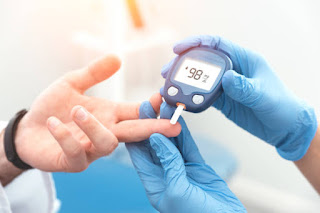Access To Diabetes Care
My parents are part of the estimated 422 million adults living with diabetes. Additionally, my dad, Fitzroy has Stage 4 kidney disease; dad also has Type 1 diabetes and takes insulin. On the other hand, my mom has Type 2 diabetes and takes oral medication. The global prevalence of diabetes has nearly doubled since 1980, rising from 4.7% to 8.5% in the adult population. This reflects an increase in associated risk factors such as being overweight or obese. Over the past decade, diabetes prevalence has risen faster in low and middle-income countries than in high-income countries. Diabetes occurs when our pancreas is unable to make sufficient insulin. The hormone insulin (which is made in the pancreas) is needed to convert sugar, starches and other food into energy needed for daily life. In people with diabetes, either the pancreas doesn't make insulin or the body cannot use insulin properly. Without insulin, sugar the body's main energy source builds up in the blood.
Diabetes is a major cause of blindness, kidney failure, heart attack, stroke and lower limb amputation. Healthy diet, physical activity and avoiding tobacco use can prevent or delay type 2 diabetes. In addition diabetes can be treated and its consequences avoided or delayed with medication, regular screening and treatment for complications. In 2007 the United Nations General Assembly adopted resolution 61/225 designated November 14 as World Diabetes Day. World Diabetes Day is set aside to raise awareness about how to improve its prevention, diagnosis, and management. The ongoing COVID-19 pandemic continues to create many challenges in the health care system, especially to ensure continuity of essential services and medications for people living with diabetes. Unfortunately, many diabetics have had their appointments rescheduled due to COVID19 and in some instances there has been a shortage of the life saving drug insulin.
What are the symptoms of diabetes?
Persons with diabetes may experience either symptoms of high blood sugar or low blood sugar.
People who have high blood sugar might have some of the following symptoms: excessive thirst; frequent urination; gatigue; blurred vision; extreme hunger; tingling or numbness in hands or feet; Sores that are slow to heal; Very dry skin
Access to Diabetes Care
The theme for World Diabetes Day 2021-23 is access to diabetes care. Access to diabetes care can be complicated. In older patients who have Type 1diabetes they usually require someone to administer their insulin as well as to arrange their daily medication. Diabetes in most instances is not the only medical condition for diabetic patients. Diabetes care can be quite costly; especially in societies where universal health insurance does not exist. Patients are required to pay out of pocket for purchases of glucometers, syringes, needles for the glucometers and testing trips. These recurring costs can and does severely impact the diabetic; especially the elderly who are on a fixed income from pension. Regrettably, in many developing countries the elderly do not have a pension. Those patients who develop kidney disease oftentimes have to join a long waiting list to get on the limited dialysis machines as is the case in Jamaica. Sadly, some die. While there are private facilities which offer dialysis the majority of Jamaicans cannot afford this service.
Discovery of Insulin
100 years after the discovery of insulin, millions of people with diabetes around the world cannot access the care they need. People with diabetes require ongoing care and support to manage their condition and avoid complications. The centenary of the discovery of insulin presents a unique opportunity to bring about meaningful change for the more than 460 million people living with diabetes and the millions more at risk. United, the global diabetes community has the numbers, the influence and the determination to bring about meaningful change. We need to take on the challenge.
Diabetes is a chronic disease, which occurs when the pancreas does not produce enough insulin, or when the body cannot effectively use the insulin it produces. This leads to an increased concentration of glucose in the blood (hyperglycaemia). Type 1 diabetes (previously known as insulin-dependent or childhood-onset diabetes) is characterized by a lack of insulin production. Type 2 diabetes (formerly called non-insulin-dependent or adult-onset diabetes) is caused by the body’s ineffective use of insulin. It often results from excess body weight and physical inactivity. Gestational diabetes is hyperglycaemia that is first recognized during pregnancy. Let us join together in support of this global campaign in raising awareness regarding the need to expand diabetes diagnosis and treatment. Access to diabetes care is critical to the sustainable health of the nation.
Wayne Campbell is an educator and social commentator with an interest in development policies as they affect culture and or gender issues.
waykam@yahoo.com
@WayneCamo
©
#WorldDiabetesDay #AccesstoDiabetesCare #Jamaica



This is indeed a worldwide problem with such a high number. We really need to join hands together to raise awareness. Keep up the great work Wayne.
ReplyDelete